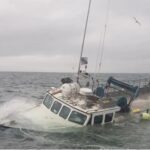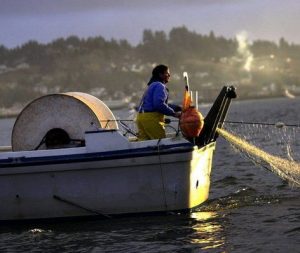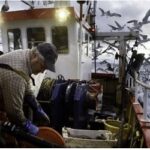What’s the Catch? Commercial Fishing and the Risks Needed to Get Your Fancy Supper.
By Guest Writer Matt Rhoney
Commercial fishing. It’s gone from an obscure asterisk of a profession to a household name recently. With the advent of reality television and America’s recent fascination with dangerous careers, commercial fishing has become one of the world’s most famously risky gigs. Like oil field workers, scuba divers, and extreme wildlife chasers, commercial fishermen are icons of bold living. People tune in to their sets nightly to watch the exploits of hirsute men who live for the thrill of the chase.
What is the reality of these danger chasing anglers? Are things really so extreme? And if so, what makes the fishermen tick? Why risk life and limb just to sell fish meat to people they don’t know? Let’s find out.
The Dangers
Commercial fishing is truly deadly. For decades now, reports have been published that identify it as extremely lethal. One report from the early 1970s said that “fishermen’s fatal accident rates were at least twice those of coal miners and more than 20 times the rate of men in manufacturing industries.” This report listed fatigue and navigation errors are major culprits. Long hours in dangerous territory are never a good idea; when you’re tired, you’re not at your best.
Look to the more recent data, and it appears little has changed. A 2013 report said “The commercial fishing industry has one of the highest injury and mortality rates of all occupational areas.” Like the 1971 study, it identified the long hours and difficult work as serious hazards. Studying this stuff isn’t pretty; the reports says that identifying causes of death is often difficult to due the water-damaged state of corpses by the time pathologists get to them; fishermen frequently sustain repeated deadly injuries, several of which could have done the final job.
Why is it so Dangerous?
Fishermen are out in small boats in violent seas. They are at the mercy of nature at her nastiest. Obviously, this job is dangerous, and no signs up for it thinking it’ll be a walk in the park.
Still, though, many watchdogs and people in the industry point to a lack of oversight. Companies are out to make a profit, plain and simple. And the Coast Guard does not have the means to make the inspections which would be necessary to keep things clean. According to The Center for Public Integrity, the Coast Guard is only required to check safety equipment every other year. That’s infrequent for such high-wear gear.
Why Do They Do It?
Money, for one. Demand, for the other. The public loves commercial fish. Companies love to feed people. Fishing companies will pay top dollar to workers willing to risk their necks to catch food for Americans from Alaska to Florida. Employers often neglect to take their employees’ safety needs seriously, leading to a huge variety of workplace traumas and hardships.
And, of course, some people are simply drawn to extreme lifestyles. Rock skiers, mountaineers, and other daredevils live for the thrill of diving deep into the abysses the rest of us would pay dearly to avoid.














































